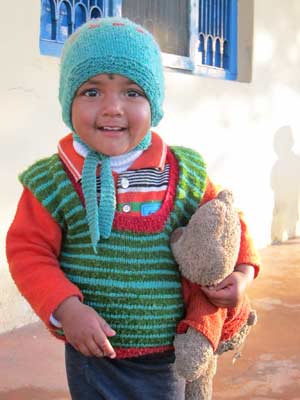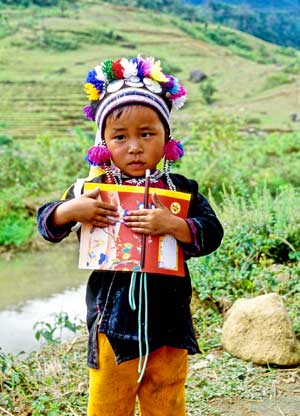My View of the World
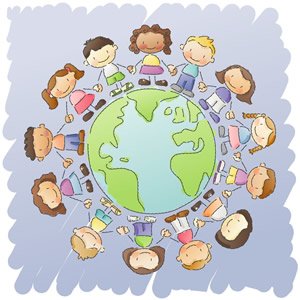 I could spend a lot of time trying to explain my view of the world as an interconnected global community – or I could show you this picture that I borrowed from a UNICEF holiday card:
I could spend a lot of time trying to explain my view of the world as an interconnected global community – or I could show you this picture that I borrowed from a UNICEF holiday card:
It’s a simple image, but it sums up my feelings that world peace is possible through people-to-people connections.
I could also palaver on endlessly about what I see as the important relationship between peace and tourism, about how people who travel are more appreciative of other cultures, blah, blah, blah – or I could just quote Mark Twain:
“Travel is fatal to prejudice, bigotry,
and narrow-mindedness.”
Even die-hard rednecks have been known to experience an attitude shift in response to personal contact with “foreigners,” and folks who are offered kindness – sometimes from those that have nothing else to give – find their hearts forever changed.
Thoughtful travelers are goodwill ambassadors – putting a friendly face on their home country wherever they go in the world
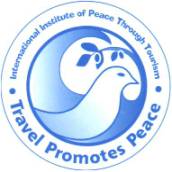 If I ran the world, a copy of the International Institute of Peace Through Tourism Credo of the Peaceful Traveler © would be issued with every passport:
If I ran the world, a copy of the International Institute of Peace Through Tourism Credo of the Peaceful Traveler © would be issued with every passport:
- Journey with an open mind and gentle heart
- Accept with grace and gratitude the diversity I encounter
- Revere and protect the natural environment which sustains all life
- Appreciate all cultures I discover
- Respect and thank my hosts for their welcome
- Offer my hand in friendship to everyone I meet
- Support travel services that share these views and act upon them and,
- By my spirit, words and actions, encourage others to travel the world in peace
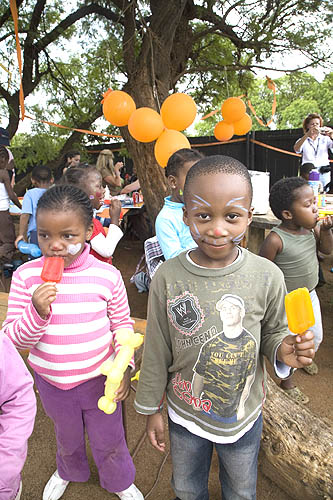 In addition to creating goodwill, travel experiences put names on foreign places.
In addition to creating goodwill, travel experiences put names on foreign places.
In an era when our schools (apparently) no longer teach geography, it’s easy to feel indifferent about a far-off country with an unfamiliar name and – in the extreme – to tolerate or support hostile action in that place.
“War is God’s way of teaching Americans geography” said the 19th – century cynic Ambrose Bierce.
What follows below is a presentation I made to a large group of travel journalists and public relations professionals – my colleagues in the Society of American Travel writers. I’m including it here because in many ways it applies to all travelers, certainly all authentic travelers.
I’ve been a member of SATW since 1983 and started writing travel a few years before that. However, I only became actively involved in international issues after September 11, 2001. On that awful day, I resolved to stay better informed about global events and U. S. foreign policy and to find a way to work for human rights and non-military conflict resolution.
While my subsequent efforts with not-for-profit organizations have consumed big chunks of my writing time, they have also provided new energy and direction to my career. These days, I’m happiest when I’m working on a story that combines my love of exotic destinations and my commitment to peace through travel.
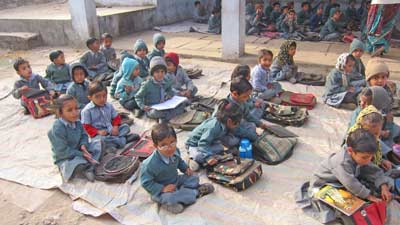 Here are some thoughts – for travel journalists and public relations professionals – on ways we can work for a better world through our travel writing and travel clients.
Here are some thoughts – for travel journalists and public relations professionals – on ways we can work for a better world through our travel writing and travel clients.
For journalists
- Write about “suspect” people and places in order to dispel old prejudices and set the record straight.
I live in San Diego – a city full of Vietnam vets. When I told friends I was headed to Saigon to research a travel article, some of them looked at me like I was crazy.
“ ’Nam? You must be nuts. It’s a horrible place. You couldn’t pay me to go back there,” one former Marine told me.
In fact, my interest in Vietnam was piqued by interaction I’d had with Vietnamese immigrants living in our community. My wonderful friend Tran had described her homeland, and I wanted to see it for myself.
While I traveled in Vietnam, the war stories I’d heard from friends were never far from my mind. Once home, I poured my heart into “Finding Peace in Vietnam” and suffered over every cut I had to make to bring it to the assigned word length. The story won a San Diego Press Club Award, but the real satisfaction was in sharing my view of a peaceful Vietnam with our readers.
- Help your readers make personal contact with locals in both the First and Third World.
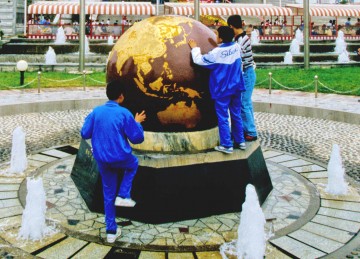 For me, this means writing about independent travel – not tours and cruises – and venturing off the beaten path. Attitude-changing personal interactions are more likely when travelers are not surrounded by their compatriots and following a fixed itinerary.
For me, this means writing about independent travel – not tours and cruises – and venturing off the beaten path. Attitude-changing personal interactions are more likely when travelers are not surrounded by their compatriots and following a fixed itinerary.
While Peace Through Tourism efforts are often focused on the developing world, I’m in favor of encouraging people-to-people connections over the entire planet. I think that even our best friends – Kiwis, Aussies, Brits, and others – would appreciate contact with Americans who are friendly and respectful.
- Take the plunge into voluntourism – combine volunteer time with vacation activities – and share the psychic rewards.
Going overseas to help others is a win-win situation. Travelers have fun and spread goodwill, and the host country benefits from their time and talent. Hands Up Holidays and Volunteer Abroad offer lots of good ideas about how “to change the world while traveling.”
When writing about voluntourism, I think it’s important to clearly describe the degree of helping required, lest a senior person find she is expected to swing a hammer. In my mind, the opportunities fall into three categories: “nonfat,” “lite,” and “hearty.”
“Nonfat voluntourism,” also known as “philanthropic tourism,” involves donors visiting projects to which they’ve contributed. These folks exercise only their wallets. One example: Americans for UNFPA provides access to United Nations Population Fund projects around the world.
“Voluntourism lite” involves playing with kids in orphanages, interacting in schools, gardening, painting, and similar mildly-strenuous activities. Airline Ambassadors International is one of the best-known voluntourism lite organizations. Trips include time for sightseeing, shopping, and recreation, as well as meaningful volunteer experiences.
The “hearty meal” means building houses with an organization such as Habitat for Humanity or cleaning up after a natural disaster. Wimps need not apply.
“Traveling for a Cause” was my first attempt at writing about helping vacations.
- Seize every opportunity to provide “How You Can Help” information as part of your story.
 I went to Zambia and South Africa to research travel stories, but I also really wanted to let our affluent readers at Ranch & Coast know how they could help with the critical issues of AIDS and poverty. While I normally just write the monthly travel feature in the magazine, I pitched “Making A Difference in Africa” for the Giving Back (philanthropy) section and got a green light.
I went to Zambia and South Africa to research travel stories, but I also really wanted to let our affluent readers at Ranch & Coast know how they could help with the critical issues of AIDS and poverty. While I normally just write the monthly travel feature in the magazine, I pitched “Making A Difference in Africa” for the Giving Back (philanthropy) section and got a green light.
For other markets, an abbreviated form of the same info could have been included as a sidebar to an Africa travel story. By providing information on non-governmental organizations working in the area, we encourage armchair travelers to donate funds, and we give active travelers ideas about places they can volunteer.
In another issue of Ranch & Coast, I capitalized on the fact that Greg Mortenson’s Three Cups of Tea was selected for One Book One San Diego (a program that encourages all San Diegans to read the same book at the same time), and squeezed “Educating A Community,” a one-pager on the Central Asia Institute , into Giving Back. While our readers are unlikely to visit Afghanistan and the border regions of Pakistan in the near future, Mortenson’s efforts to create peace in these areas are truly inspirational.
For public relations professionals
I will always be grateful to Ann-Rebecca Laschever at Geoffrey Weill Associates for suggesting I take a stash of school supplies when I visited Phinda Private Game Reserve in South Africa. My puny sack of pencils, pads, and colored pens provided an intro to a village school and a real life look at Africa. I also bought school supplies at an open market near Sapa, Vietnam, before heading out to remote tribal villages, and they were enthusiastically received.
- Provide background information on the local culture and advice on being respectful.
- Publicize your clients’ efforts to “go green.” Thoughtful travelers want to support these businesses.
- Be sure to let journalists know if your clients contribute to humanitarian services in the vicinity of their resort, cruise port, etc. We can’t write about it if we don’t know – and our readers care.
- Likewise, do your clients contribute to relief efforts after a natural disaster? The first group of Airline Ambassadors International volunteers to leave for Peru after the earthquake last year delivered a large supply of American Airlines in-flight blankets.
- Do your clients train and employ local residents? Provide housing? Healthcare?
- Do your clients donate a percentage of tour costs to local causes? For instance, Country Walkers’ Women’s Adventures incorporate a philanthropic component.
- Encourage clients to invite journalists to travel independently – thus promoting people-to-people contact. Press trips may be efficient, but they make it much harder to write a how-I-wandered-off-the-beaten-path-and-discovered-lovely-people story.
The bottom line(s):
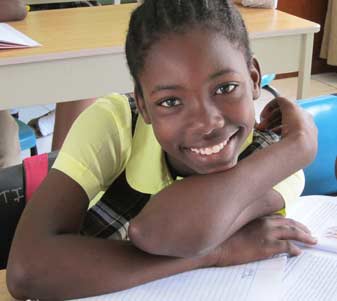 As travel professionals, we have an opportunity to make a difference in the world. Each one of our readers is a potential goodwill ambassador – and so are we.
As travel professionals, we have an opportunity to make a difference in the world. Each one of our readers is a potential goodwill ambassador – and so are we.
The world may never look like an image from a UNICEF greeting card, but if we do our jobs: armchair travelers will support humanitarian causes, the faces that represent our country will have smiles on them, and able-bodied folks will roll up their sleeves and make a difference in the developing world.
The global community consists of people-to-people connections, and we are some of those people.
“Be the change you want to see in the world.”
Mahatma Gandhi

